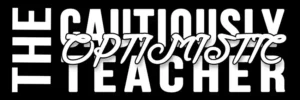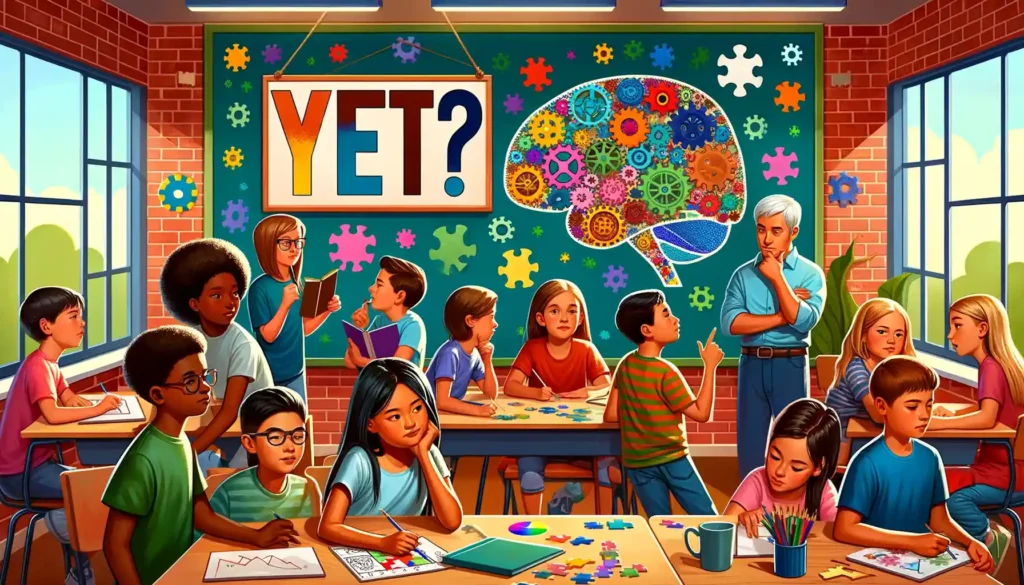Welcome to a journey that transcends the boundaries of traditional learning! In this lesson, we’ll explore the transformative power of a seemingly small word: “yet.” As we navigate through various subjects and life lessons, we often encounter hurdles that seem insurmountable. However, by understanding and applying the concept of “yet,” we unlock a world of possibilities and growth. This lesson is about successfully progressing through academic achievement and fostering an attitude that will empower you to face any challenge with confidence and determination.
Learning Goals
- I will understand the role of “yet” in developing a growth mindset and overcoming challenges.
- I will recognize how embracing “yet” can transform my approach to learning and personal growth.
- I will identify strategies to apply the concept of “yet” in my academic life and beyond.
Materials
Process
- Begin by reading the handout, “The Power of Yet.”
- Have students complete the “Developing Yet Statements” worksheet.
- Use the reflection questions in the “Unleashing the Power of Yet” handout as a guide for classroom discussions or have students work on the questions individually.
Unleashing the Power of Yet
In a classroom buzzing with activity, students like you are on a journey of discovery, navigating through puzzles of numbers, words, and ideas. Some puzzles fit together effortlessly, while others seem impossibly complex. Facing a tough math problem or a confusing science concept might make you think, “I can’t do this.” But what if there’s a secret weapon that could change your perspective? This weapon is a small and powerful word: yet.
The Transformative Magic of Yet
Let’s imagine you’re in the middle of an adventurous video game, battling a boss that just won’t budge. After several attempts, the thought “I can’t beat this level” might cross your mind. However, by adding a simple yet to this thought, you’re opening a door to a world of possibilities. “I can’t beat this level…yet” transforms an ending into a beginning, a full stop into a path forward. This little word carries a big promise: the promise of growth, learning, and eventually overcoming the challenge.
The Science of Yet
The concept of yet is rooted in what psychologists call the growth mindset. This term was popularized by Dr. Carol Dweck, a psychologist who has dedicated her career to studying how our beliefs about ourselves influence our actions. According to her research, people generally adopt one of two mindsets: fixed or growth.
When you say yet, you’re activating your growth mindset. You acknowledge your current limitations while also recognizing your potential for improvement. This perspective is crucial in academics and every aspect of life. Whether it’s learning a new skill, overcoming a personal challenge, or pursuing a passion, the mindset of not yet propels you forward.
How Yet Rewires Our Brain
Neuroscience offers fascinating insights into how adopting a growth mindset, symbolized by the word yet, can change how our brains work. When we tackle challenges and learn new things, our brain forms new connections. These connections are strengthened through practice and perseverance. The more we push through difficulties, the stronger and more capable we become.
What’s even more interesting is how our attitude toward challenges affects our brain’s response to them. When faced with a tough problem, a growth mindset encourages our brain to light up with activity, engaging in the process of learning and problem-solving. This activity represents the brain’s adaptability, or neuroplasticity, which is its ability to form new neural connections throughout life. By embracing yet, we’re not just being optimistic; we’re engaging our brain in a way that promotes learning and resilience.
Applying the Power of Yet in Your Life
To harness the power of yet, start by paying attention to moments when you feel stuck or discouraged. Instead of concluding, “I can’t do this,” add yet to remind yourself that you’re on a journey of learning and growth. Identify steps you can take to progress, such as seeking help, practicing more, or trying different approaches. Remember, the path from “can’t” to “can” is paved with patience, effort, and persistence.
Embrace the small victories along the way. Every step forward, no matter how minor it seems, is a testament to your growing abilities and your commitment to the growth mindset. Sharing your challenges and achievements with others can also be incredibly motivating. It helps create a supportive community that believes in the power of yet.
The journey to mastering new skills and overcoming obstacles is marked by the belief in yet. It’s a way of viewing the world that embraces challenges as opportunities for growth. By adopting a growth mindset, you open the door to endless possibilities.
Reflection Questions
- Think of a recent challenge where you felt stuck. How could applying “yet” change your approach?
- Reflect on a past achievement. How did persistence and a growth mindset play a role in overcoming obstacles?
- How can discussing your goals and challenges with others support your journey toward a growth mindset?
- What are practical steps you can take to strengthen your belief in the power of “yet”?
Developing Yet Statements for a Growth Mindset
Instructions: Read each case study below. Each one describes a student facing a struggle in a more detailed scenario. Your task is to provide a Yet statement that helps reshape the difficulty faced in the case study. A Yet statement is a way to express that you haven’t mastered something yet, but you are open to learning and growing.
Tips for Creating Yet Statements:
- Start with acknowledging the current struggle.
- Use the word yet to show that the struggle is temporary.
- End with a positive statement that implies growth and potential for improvement. Be as specific as possible.
Example:
Struggle: I can’t solve this math problem.
Yet Statement: I can’t solve this math problem yet, but I will keep practicing and asking for help until I get it.
Case Study 1: Alex has always been interested in math, but lately, he’s been feeling frustrated. He tried to solve a complex algebra problem several times, but he couldn’t find the correct solution. He’s starting to doubt his abilities and is considering giving up on math altogether.
Your Yet Statement:
Case Study 2: Maria has been playing the piano for a few years and loves the instrument. However, she struggles with reading music notes quickly, which makes it hard for her to play more advanced pieces. She’s worried that she’ll never be able to play her favorite songs.
Your Yet Statement:
Case Study 3: Jamal is passionate about science and dreams of becoming a scientist. However, he feels discouraged because his experiments in the school lab don’t always work out as he planned. He’s starting to wonder if he’s really cut out for a career in science.
Your Yet Statement:
Case Study 4: Sara loves writing stories and has a vivid imagination. But when it comes to sharing her stories with her classmates, she feels anxious and fears that they won’t like her work. This fear is holding her back from participating in the school’s writing contest.
Your Yet Statement:
Case Study 5: Kevin has always admired the school basketball team and wants to be part of it. However, he feels that his height is a disadvantage, as most of the team members are taller than him. He’s starting to think that he might not be cut out for basketball.
Your Yet Statement:
Case Study 6: Emily has always been fascinated by other cultures and is currently learning a new language. Despite her interest, she finds it challenging to remember new vocabulary words and feels overwhelmed by the grammar rules. She’s worried that she might not be able to become fluent.
Your Yet Statement:


